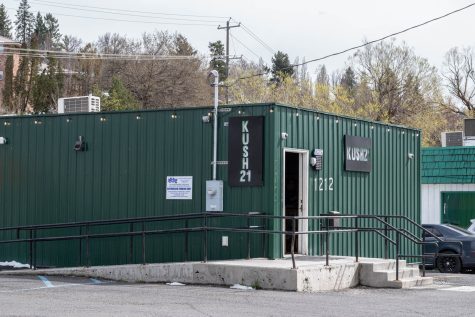WSU foreign language ranked seventh most innovative
March 20, 2017
WSU’s Department of Foreign Languages and Cultures recently ranked seventh in the Best Colleges’ 10 Most Innovative Colleges for Foreign Language Study. This list also includes major Ivy League universities such as Cornell, Columbia and Yale.
When looking at the rankings, Best Colleges took a unique approach, said Jolyon Hughes, German professor and Department of Foreign Languages and Cultures chair.
Based on the description posted online, they looked at the innovation and relevancy of the program. WSU doesn’t fit the list of biggest foreign language departments, but has a different approach for teaching, Hughes said.
He said he thinks professions major programs contributed to WSU’s place on the list. For example, in Spanish, Chinese or Japanese, they look at language as a component in another field of study. If a student studies chemistry or engineering, a foreign language can open up internship opportunities in different countries, Hughes said.
“Not all the biggest companies in the world are from the U.S.,” he said. “So, if I’m a mechanical engineer, I’m pretty interested in working at Volkswagen, Audi, Mercedes, BMW, which are all synonymous with German engineering. If you want to work or do an internship for those companies … [the foreign language department] can help you put your best foot forward.”
Depending on what students want to do, an industry leader from another country exists, Hughes said. For example, China has some of the largest banks in the world.
Developing such programs has been a completely in-house way of trying to find relevance in an institution that does not always require a foreign language, Hughes said.
The University of Washington offers 54 languages because every student is required to take a minimum of two years of foreign language no matter their major, he said. At WSU, not every major requires a foreign language, making WSU’s department much smaller, Hughes said.
Located inland, in a more rural part of the state, WSU also has trouble finding an audience to learn foreign languages, Hughes said. For the foreign language department, it became necessary to find an angle to show the importance of learning a foreign language.
The foreign language department was one of the original departments at WSU, Hughes said. Due to the economic power of Germany through World Wars I and II, German became a main language of study. Students learned by listening and writing, which served as an early version of the Language Lab, Hughes said.
The advancement of technology allowed the language department to do many more things, Hughes said. But he said the original idea remains the same: students still learn a language through practicing.
WSU has placement software, or STAMP testing, that assesses how well the curriculum improves student fluency, Hughes said. By looking at how well students did in high school, compared to how well they do after two years of foreign language, the department can see how effective the curriculum is and adjust accordingly, he said.
“The people here look at problems from a new perspective,” Hughes said. “They look at things and say, ‘how do we show our relevance in the 21st century?’ ”
WSU’s Department of Foreign Languages and Cultures stays innovative because the faculty looks forward, outward and for the best interest of the students, he said.
Hughes said he would like to see WSU offer Danish and Brazilian Portuguese in the future, and for more majors to add foreign language requirements. He said he would also like to see more resources and higher visibility for the department, Hughes said.
Laurie Heustis, academic program manager and adviser, said she likes the student advising part of the foreign language department and the variety of majors in foreign language, she said, as well as 13 minors.
Because of high school classes, students may not always start at the 101-levels, and placement testing can determine that, Heustis said. Students have many options and may take two to three languages at once, if they choose.
“Students that take languages normally love languages,” Heustis said. “It’s kind of like math, where you either like it or you don’t.”
Faculty work personally with students on their goals, she said, and they constantly try new ways to make it easier for students to obtain their degrees.
For example, in the French major, the department has three options: professions, general and teaching, Heustis said.
Within the last two years, the professions majors have gained a lot of attention, Heustis said.
Professions majors require an internship component so students get exposure to their interest area within their chosen major. Students also have specialized professions courses, which cover different areas of business, health, criminal justice and translation services, she said.
The courses constantly evolve over time, Heustis said. Right now, some courses are moving toward UCORE requirements. WSU will implement a Russian minor this fall.
The foreign language department hopes to expand its work alongside other departments, she said. The criminal justice department recently came to foreign languages to develop a foreign language course that caters to aspects of criminal justice.
In addition, the foreign language department is working on a proficiency certificate so students will earn something after taking language courses, Heustis said.
“You never know when a language is going to be called upon,” she said.
For example, during Hurricane Katrina, a WSU student who had taken French and served in the military was surveying the area in a helicopter, when someone asked if anyone spoke the language. He volunteered and did translations to reassure a family that only spoke French, Heustis said.
“It speaks to the heart and you have that great interaction with another person,” she said. “It’s that love of the language and cultures that makes better relations with other countries.”




















